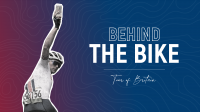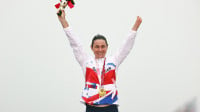|
The past four years of Jon-Allan Butterworth's life have been nothing short of astonishing.
Since losing his left arm in a rocket attack during miltary service in Iraq, the former RAF serviceman has become a world para-cycling champion and record holder. And the 25-year-old has ambitions to extend his medal collection at next week's World Para-Cycling Track Championships in Los Angeles, where he will compete in the 4km pursuit.
Jon-Allan’s story is shocking but the way he tells it underlines he is a man who never panics in any situation, even when his life is on the line, and most certainly not at the start line of a bike race. Already a veteran of Afghanistan, he was working in the explosive storage area at Basra Air Station in August 2007 when it was hit by rocket fire.
"The base got attacked on average eight times a day," said Jon-Allan, who joined the RAF at 16 and became a weapons technician.
|
"The shrapnel tore through my left arm. It was still attached. I had a major arterial bleed. I felt no pain whatsoever. My training just automatically kicked in. I thought: 'Right, I'm in a bad way." Jon-Allan Butterworth |
||
"They reckoned you could survive a medium-sized shell at 3m. Shrapnel would hit hard ground and go at 45 degrees above your head, so the drill was to get down on the floor. On that day we got hit by a larger rocket and I was unluckily on fairly soft ground so it exploded into the ground and lying down didn't work as effectively as it might have done."
What happened next probably took 45 seconds, although looking back he says it feels like 10 minutes, and his refusal to panic obviously played a big part in saving his life. At the time everything slows down. I was shaken, there was dust everywhere," he said.
"I got up to my knees and was brushing myself down when I noticed my arm was hanging there and bleeding everywhere.
"The shrapnel tore through my left arm. It was still attached. I had a major arterial bleed. I felt no pain whatsoever. My training just automatically kicked in. I thought: 'Right, I'm in a bad way'.
"In the pouch on your left side you carry a field dressing, morphine and a tourniquet.
"I pulled out the morphine and thought: 'What good’s that? By the time it starts working I'll be dead'. A field dressing holds a pint of blood and I think I've leaked out more than that already. The tourniquet was the only option to save my life."
He spent a week in Basra, undergoing transfusions of several pints of blood each day, and then was flown home to Sutton Coldfield via Germany. It was still touch-and-go whether he would make it through but Jon-Allan doesn’t remember being worried.
"At the time I felt perfectly normal. I was pumped full of drugs and felt OK," he said. "I was in the ICU for a week after I got back to the UK and on the critical list for two weeks.
"I got released on the weekend and we went to the local pub. I had steak and chips – a proper meal – and a pint of Guinness. I was still on the critical list and I didn't know!"
He found cycling through Battle Back, a scheme run by Paralympics GB and the Ministry of Defence, which helps wounded service personnel return to an active life through sport.
Wearing an arm that attaches directly to his handlebars, Jon-Allan made his international debut last year, coming from nowhere to win the 1km time trial in Montichiari in a world record time for his C5 category.
However, the "kilo" is classified differently at the Paralympics, which makes him far less likely to win, so he has stepped up his training in the 4km pursuit too for the worlds.
If he is to take gold there he must overcome Australian world champion and world record-holder Mick Gallagher, a man who has never been beaten, but Jon-Allan has already shown he is pretty special.
His coach says that calm, analytical approach, even at the toughest times, combines with the ability to have big dreams, aiming for targets others might not dare.









